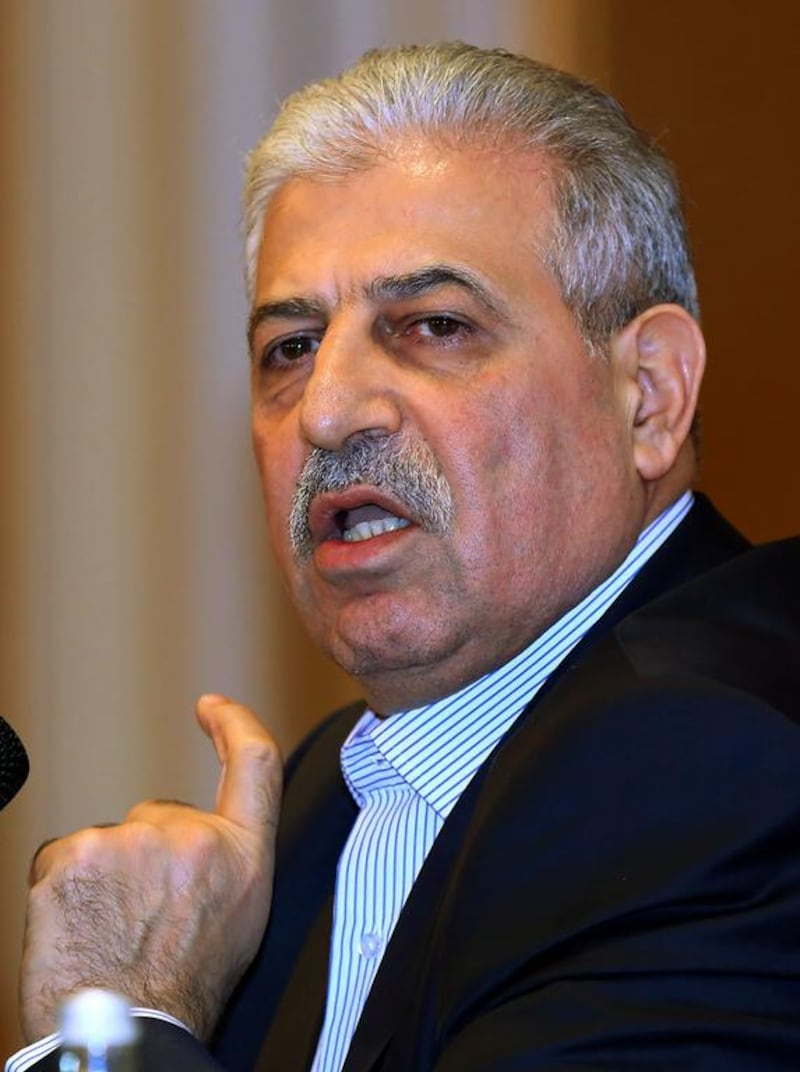ERBIL // The governor in charge of Mosul when it was overrun by Islamist militants has blamed Iraqi prime minister Nouri Al Maliki for the extremists’ military successes and warned that a counteroffensive would lead to untold bloodshed.
Atheel Nujeifi, who headed Nineveh province, accused the Shiite premier of causing widespread anger at the central government that allowed the Islamic State in Iraq and the Levant to capture the provincial capital last week.
[ Click to see map of lraq conflict ]
Seizing swathes of territory since then, the Al Qaeda-splinter group’s onslaught has edged towards Baghdad and threatens to trigger a sectarian war between Sunnis and Shiites.
“He created the crisis,” Mr Nujeifi, who fled the city on June 10, said of Mr Al Maliki, describing the premier’s handling of the crisis as “very bad”.
He said Mr Al Maliki “never listened” to repeated warnings about the deteriorating security situation around Mosul.
In an interview with The National, Mr Nujeifi painted a picture of escalating chaos in the days before Iraq's second-largest city fell to the militants.
The 56-year-old described being targeted by a sniper on June 8, two days before the ISIL campaign.
The assassination attempt, part of a campaign by militants against officials and security forces in the city, was the tenth such attempt on his life since he became governor in 2009.
Such attacks were staged by ISIL as well as other militias that gradually chipped away at the military’s integrity and standing in the region, easing the extremists’ takeover.
Echoing the view of many in the largely Sunni areas that have fallen during the ISIL offensive, Mr Nujeifi also placed blame on the military and police force for their harsh treatment of Mosul’s population.
The city’s 1.7 million residents put up no resistance to the ISIL campaign because of animosity toward the armed forces, which many Sunnis consider to be a tool of the country’s Shiite majority.
“When ISIL came to Mosul, there was already tremendous pressure on the people by the army. Most of the people didn’t think the army was a part of them,” he said.
Speaking from a hotel in Erbil, the capital of Iraq’s autonomous Kurdish region, 90 kilometres from Mosul, Mr Nujeifi, a Sunni who rose to prominence through property and other businesses, warned that a government attempt to retake the city would backfire.
Residents of his province would fight a return of the military that many Sunnis consider to be dominated by Shiites.
He said the only way to retake the city from ISIL would be if Mr Al Maliki could raise a force led by Mosul residents. Otherwise, the government risked further resistance in the city and from Nineveh’s population of 3.7 million.
“If they just send in the army, people will fight. People feel that this would just lead to the return of the previous situation,” he said.
Widespread Sunni anger burst into the open in January when militants captured the western city of Fallujah, another Sunni stronghold.
That enabled ISIL militants to stage a blitzkrieg takeover of Mosul that began on June 9 and ended with the militant group seizing control of the city and looting more than US$400 million (Dh1.47bn) from banks in the area, Mr Nujeifi said.
He claimed to have warned Mr Maliki and his military advisers “several times” about ISIL’s rise, including during a meeting of provincial governors in Baghdad in January, at about the time Fallujah was seized by militants.
During the meeting, he slipped the prime minister a note urging him to reconsider his approach to handling Nineveh’s deteriorating security situation and listen to military commanders near Mosul who were raising alarms about the security situation.
“He just put it in his pocket and walked out,” Mr Nujeifi said.
Now, he has set up office in a village outside of Mosul that is under the protection of Kurdish Peshmerga fighters. He and his staff are trying to resume handling provincial affairs in the hope of returning to power in Nineveh and Mosul.
Mr Nujeifi also said he wanted to build up a military force to take back the city, although he did not elaborate.
His farm in the Nineveh countryside had been commandeered by ISIL, along with the 100 Arabian horses he owned, he said.
Mr Nujeifi said Mosul was now being administered by ISIL members originally from the area who, acting like a sleeper cell, became active after an initial force of largely foreign fighters seized the city.
The foreign fighters went on to capture vast tracts of Iraqi territory and cities such as Tikrit, Saddam Hussein’s hometown. They have posted images online which they claim to be mass executions of Shiites.
Since he became governor, Mr Nujeifi has been at the centre of the areas’ sectarian disputes, which not only have involved years of attacks by Al Qaeda as well as Shiite-Sunni tension, but also disputes with the local Kurdish community.
Kurdish residents initially refused to accept him as governor unless they gained more positions on Mosul’s city council. When he tried to visit their areas to mediate the dispute, residents throwing eggs and tomatoes prevented him from entering.
In June, he narrowly survived an attack in central Mosul by three suicide bombers that killed bystanders and police. “This was the most dangerous — they were just a few metres away from me,” he said.
He has also faced roadside bombs.
Mr Nujeifi said he believed Iraq could be held together despite the surge of sectarian tension that has exploded during both the rules of Saddam Hussein and Mr Al Maliki.
“We can’t judge Iraq just by the rule of Maliki or by Saddam. They are only two figures,” he said.
hnaylor@thenational.ae





